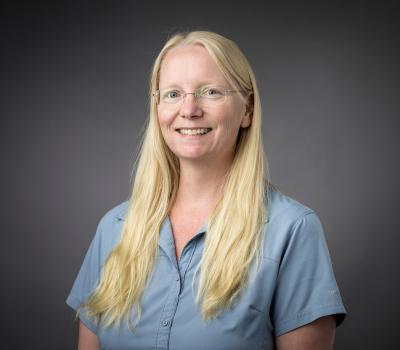Assistant Professor of Mechanical Engineering Nordica MacCarty conducts her research in the realm of humanitarian engineering. Through complex systems modeling, thermal fluid sciences, and engineering design, she seeks to understand the relationships between energy, society, and the environment. “In humanitarian engineering, we use tools to look at not only the technical aspects of a problem, but also the social, economic, and environmental components as well,” she said.
MacCarty’s research revolves around meeting global needs for household energy and clean water, with a focus on high-efficiency biomass cookstoves for developing countries. Currently, 40 percent of the world’s households burn open fires inside their dwellings to prepare food and heat water – a practice fraught with risks. Exposure to smoke from household air pollution is responsible for 4 million premature deaths each year, according to MacCarty. “The problem primarily affects women and children, because they are typically gathered around the fire during cooking,” she explained. In addition, the fires contribute an estimated 2 to 8 percent of total anthropogenic climate change, including 25 percent of global black carbon, a powerful greenhouse aerosol. “The impact is both local and global,” MacCarty added.
MacCarty joined Oregon State in 2015. After earning her B.S. in mechanical engineering from Iowa State University in 2000, she volunteered at the Aprovecho Research Center – a non-profit in Cottage Grove, Oregon that builds low-emission, high-efficiency biomass cookstoves and teaches organizations around the world about cookstove design and emissions testing. While at Aprovecho, she helped to optimize designs of small, inexpensive, and lightweight clean-combustion “rocket” cookstoves, which provide maximum heat transfer to the cooking pot with greatly decreased pollutant emissions. These designs are being implemented around the world. One widely available model that is currently produced at a family factory in China stands about a foot tall and weighs about 2 lbs.
Although she had planned to stay at Aprovecho for only a few months before starting graduate school, MacCarty ultimately stayed for 10 years as an international consultant before resuming her education, receiving a M.S. and a Ph.D. in mechanical engineering from Iowa State in 2013 and 2015. Her work with Aprovecho not only set the stage for her Oregon State research, it also played a big role in her decision to pursue advanced engineering degrees. “Working on cookstoves was very satisfying, and it helped me to see engineering as a path I could follow to make meaningful contributions to help reduce suffering in the world,” said MacCarty.
Once at Oregon State, MacCarty’s interests expanded: “I had spent a lot of time looking at the technical aspects of cookstove performance, and now I am looking at the adoption and use of the stoves in homes.” It turns out that just putting a cookstove in a home does not mean that inhabitants will use it or stop burning open fires. “I’m trying to gain an understanding of what factors lead to the uptake of clean energy technologies and the impact they have on well-being, health, and the environment,” she said. Most of her field work is conducted in Honduras and Guatemala and includes opportunities for undergraduate and graduate student involvement.
In one project, funded by MIME, MacCarty is developing a usability protocol to determine the ease with which users learn how to operate cookstoves, if design flaws inhibit their use, and to gauge the stove’s efficacy for completing intended tasks. “A cookstove may be very efficient from a technical standpoint, but if it’s difficult to operate, people will not use it,” she said.
In a second project, MacCarty and her graduate students are developing systems to monitor cookstove usage, fuel consumption, and emissions to verify performance and to access funding on the global carbon offset markets. “We need robust quantitative data from large samples to really understand the impacts – something that has been historically difficult and costly to acquire,” she explained. One recent approach has been temperature loggers – small sensors that track temperatures near open fires and within cookstoves over several months. An algorithm records temperature spikes as usage events. But the system is prone to problems: sensors burn out or get cooked, and the algorithm’s parameters can produce inaccurate results. MacCarty’s alternative calls for an inexpensive low-power logger that monitors both stove use and fuel consumption – information that reveals usage patterns. “The sensor will tell us how often the stove is used and the time and fuel savings it generates relative to a traditional fire,” she said. Saving fuel is an important purpose of the stoves, and less fuel consumption translates to lower emissions and increased carbon revenue.
MacCarty and her students are also working on a water pasteurization system with the Cottage Grove manufacturer InStove. Typically, water is purified by boiling because it provides a visual confirmation of high temperature. But pasteurization requires water to reach only 65°C for less than a minute to kill pathogens. MacCarty’s team is evaluating an automated system that rapidly heats water to the required pasteurization temperature at a rate of about 10 liters per minute, then recuperates the heat as the water cools to a useable temperature, thereby saving a great deal of energy. The team has tested the system at a girls’ boarding school in Uganda with partners at the NGO Maple Microdevelopment.
MacCarty considers engineering a tool for finding simple and elegant solutions that can help many people. “I’ve read that 90 percent of engineering design benefits only 10 percent of the world’s population,” she said. “I want to address the needs of the other 90 percent. Her work has gone well beyond her research to achieve that goal. Each summer, she takes a group of students to Central America to work with Stove Team International, a non-profit that has established cookstove factories throughout the region. “What I find most exciting,” she added, “is that I’m able to give my students the opportunity to apply engineering and understand that they can make a difference in the world.”
— Steve Frandzel




